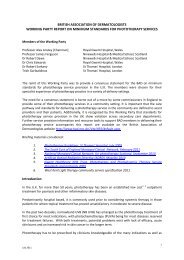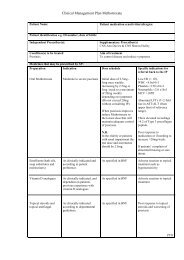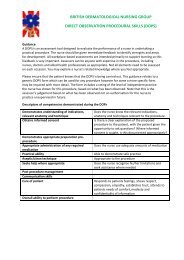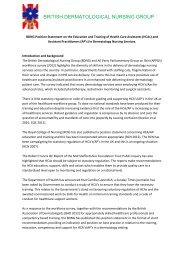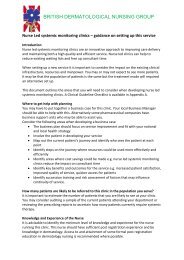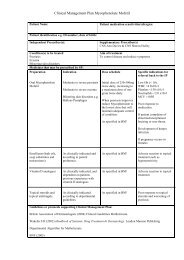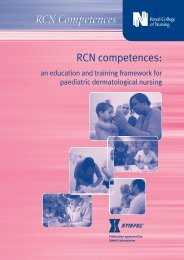Improving outcomes for people with skin tumours including melanoma
Improving outcomes for people with skin tumours including melanoma
Improving outcomes for people with skin tumours including melanoma
Create successful ePaper yourself
Turn your PDF publications into a flip-book with our unique Google optimized e-Paper software.
A3<br />
<strong>Improving</strong> Outcomes <strong>for</strong><br />
People <strong>with</strong> Skin Tumours<br />
<strong>including</strong> Melanoma<br />
Appendix 3<br />
Clinicians working in the community<br />
The guidance states that some patients <strong>with</strong> precancerous or low-risk<br />
BCCs may be diagnosed, treated and followed up by clinicians<br />
working in the community under the direction of an MDT. The need<br />
<strong>for</strong> community <strong>skin</strong> cancer clinics will vary according to the expertise<br />
available and ease of access to local hospital departments. Some<br />
cancer networks already have such services in place and it will be <strong>for</strong><br />
local commissioners to decide whether to establish them where there<br />
is currently no such provision.<br />
In the absence of cost-effectiveness evidence, a survey was<br />
conducted to in<strong>for</strong>m the resource implications of the guidance. The<br />
costs include sessional rates paid to general practitioners <strong>with</strong> a<br />
special interest (GPwSI) in dermatology in the community and a more<br />
comprehensive service cost that includes GPwSI, nurse and<br />
administrator time and consumables. In addition, hospital practitioner<br />
sessional rates have been included (Table A1). The costs at a cancer<br />
network level <strong>for</strong> the service inclusive of GPwSI time, nursing time,<br />
administration and consumables is around £625,727 per network (±<br />
25% range, £469,296 to £782,159). For a cancer network to deliver 30<br />
sessions a week <strong>for</strong> 52 weeks of the year, the annual cost of those<br />
sessions, <strong>with</strong> a GP locum payment, would be around £329,373 (±<br />
25% range, £247,030 to £411,716); at hospital practitioner rates the<br />
payment would be £196,773 (±25% range £147,580 to £245,966).<br />
Thirty sessions in a network equates to 3.4 sessions per PCT or LHB.<br />
These cost scenarios have a high degree of uncertainty because they<br />
include an element of costs <strong>for</strong> patients that have conditions other<br />
than non-<strong>melanoma</strong> <strong>skin</strong> cancer (NMSC). It also needs emphasising<br />
that the costs have been presented <strong>for</strong> in<strong>for</strong>mation purposes and it is<br />
<strong>for</strong> local commissioners to investigate whether a GPwSI service would<br />
enhance their existing services.<br />
Multidisciplinary teams<br />
The guidance recommends that cancer networks should establish two<br />
levels of multidisciplinary team – LSMDTs and SSMDTs. Skin cancer<br />
teams are currently established in some but not all cancer networks.<br />
It is estimated that 36% of all networks require at least one SSMDT.<br />
Fifty percent of networks require between three and six LSMDTs <strong>with</strong><br />
a further 23% requiring a further two to four LSMDTs.<br />
All costs in this section are based on the MDT meeting every 2<br />
weeks. For those cancer networks currently <strong>with</strong>out any <strong>skin</strong> cancer<br />
MDTs in place, the estimated annual opportunity costs <strong>for</strong> attending<br />
MDT meetings is estimated to be between £129,134 (± 25%, £96,851<br />
to £161,418) and £258,268 (± 25%, £193,701 to £322,835).<br />
138<br />
National Institute <strong>for</strong> Health and Clinical Excellence




